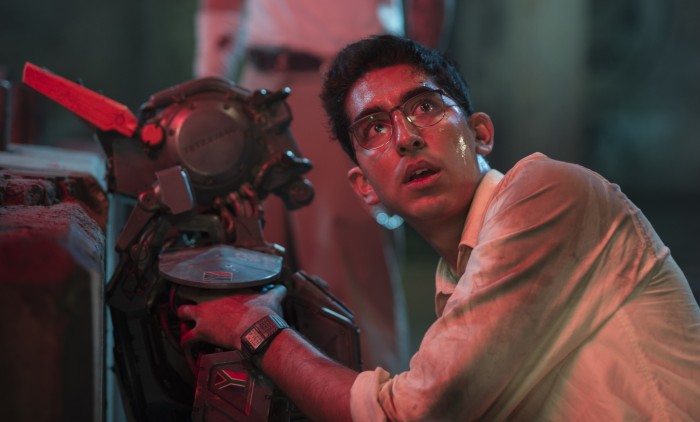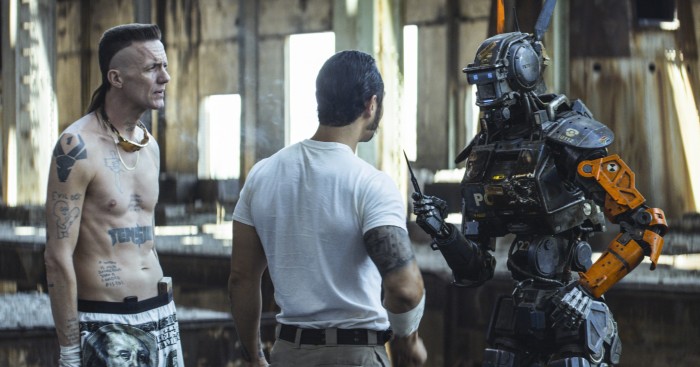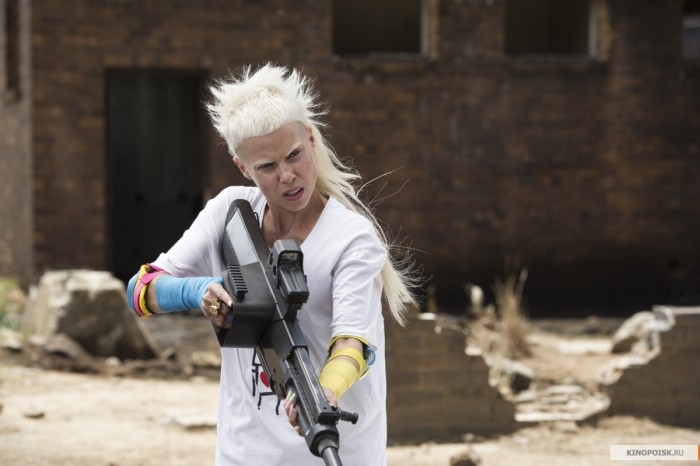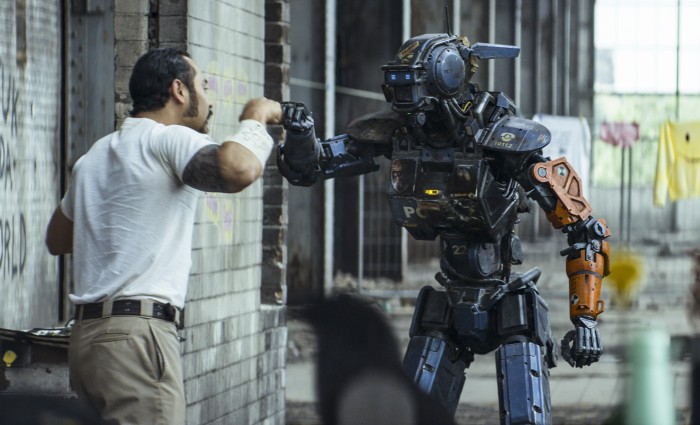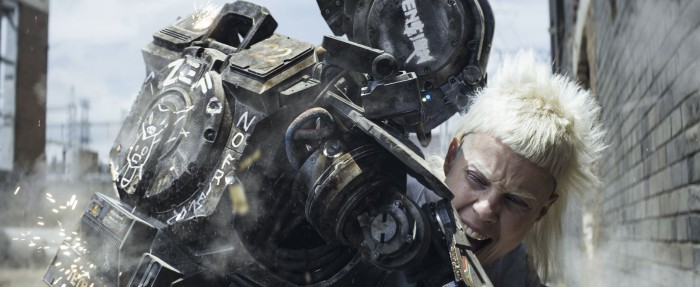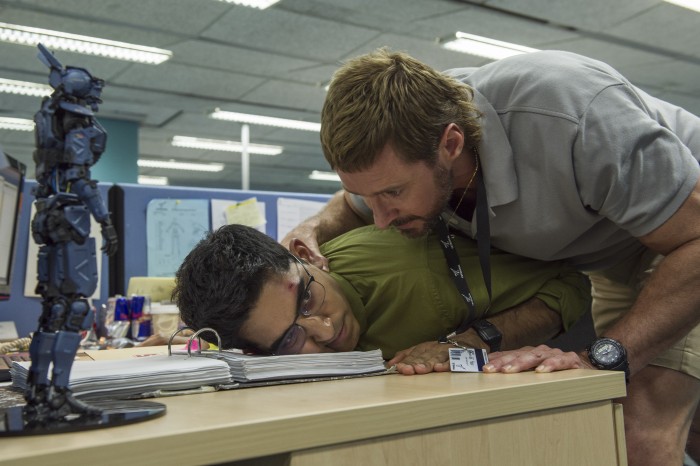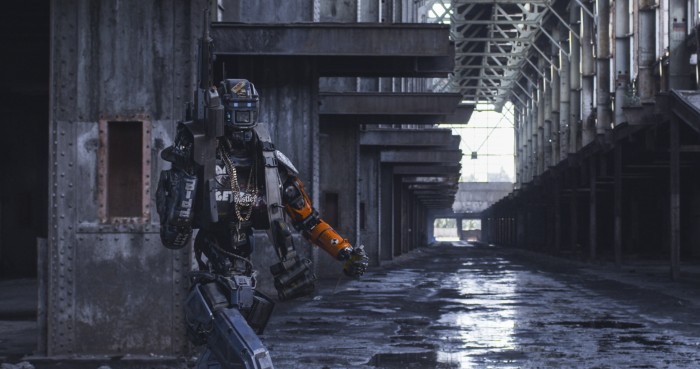'Chappie' Review: Neill Blomkamp Rehashes Old Mistakes
Following the Oscar-nominated District 9, Neill Blomkamp's sophomore effort Elysium proved a major disappointment. Even Blomkamp himself knows it, and his recent admission that he "fucked it up" by pressing ahead with a script that "just wasn't there" seemed like an encouraging step in the right direction.
But acknowledging your mistakes isn't the same thing as figuring out how to avoid them. Unfortunately, Chappie indicates that, like the childlike protagonist that gives the film its name, Blomkamp still has a lot to learn. Read our full Chappie review after the jump.
The Basics
Chappie unfolds in near-future Johannesburg, where a robot police force has just been mobilized. The so-called Scouts are the creation of Deon Wilson (Dev Patel), whose latest extracurricular project is an AI program.
He's eventually able to install an AI program into a damaged Scout, but the result — Chappie, voiced by Sharlto Copley — falls into the hands of three criminals (played by Ninja and Yo-Landi Visser of Die Antwoord, plus Jose Pablo Cantillo) who want Chappie to help them pull off a heist.
Meanwhile, Deon's colleague Vincent (Hugh Jackman) is pissed off because the popularity of Deon's Scouts means their boss (a sorely underused Sigourney Weaver) has no use for Vincent's invention, a massive human-controlled crime-fighter called The Moose.
Death by a Thousand Plot Holes
District 9 established Blomkamp as a wildly ambitious visionary, and he's still a big thinker. It's the little stuff he sucks at. The larger story is positively riddled with plot holes, and any sense of subtlety seems to have fallen right through them.
From the beginning, the story makes no sense. There's no good reason why Deon has to install his AI in Chappie, kicking off a string of crazy events, rather than in one of the several other robots littering his living room. Or why Vincent is able to pull a gun on Deon in the middle of the workday without so much as a reprimand from his boss.
There's also no explanation as to why the city of Johannesburg deemed it unnecessary to devise a backup plan in case their robo-cop program went awry, or what the criminals thought they'd accomplish by letting Deon go shortly after kidnapping him. None of these are deal-breakers on an individual basis, but collectively they snap the suspension of disbelief.
As Subtle As a Robot Battle
Blomkamp's disinterest in the finer points doesn't end there. He's never been one for subtlety. This was less of an issue in District 9, where his bluntness was smoothed over by solid storytelling, but it's much harder to ignore in the clumsy Chappie.
Every single character in Chappie consists of one note played at top volume. Vincent isn't just a villain, he's a volatile psychopath who'll happily sacrifice hundreds of others for his own professional gain. Yo-Landi isn't just nurturing, she becomes Chappie's devoted mother about five minutes after meeting him.
This lack of nuance applies even to Chappie himself, who can be summed up in a single word: "childlike." By that, I mean he's amazed by everything, and likes kids' books and toys. But real children still have personalities and quirks and preferences, whereas Chappie is modeled after the most generic movie kid imaginable.
Characters repeatedly insist he's the first robot who can think and feel for himself, but he doesn't, really. He believes everything he's told, parrots everything he hears, and mimics everything he sees. He's so impressionable, in fact, that we never get a good sense of who Chappie is outside of his human influences.
Naturally, the thudding obviousness extends to the dialogue as well. Blomkamp can't be bothered to whisper when he can shout, so Chappie spells everything out with blunt lines like "Why did you make me to die?" and "This is some fuckup."
The Muddled Message
For all of Blomkamp's bluntness, though, he still fails to get across a clear message. It starts out feeling like a critique of drone warfare or militarized police forces, but the story doesn't go down either of those channels. It's mostly concerned with the one robot who isn't a drone or a cop.
Once the film focuses on Chappie, it becomes the story of an innocent discovering that humans are terrible. But only some of them. And only sometimes. And there are no suggestions about what might or should be done about it. There's also some vague stuff about the nature of consciousness and the human soul, but again, Blomkamp simply presents those concepts without digging into them.
Most irritatingly, Blomkamp asks us to feel bad about the negative human qualities that Chappie is picking up, and then cheer for those same ugly human-inspired instincts when it makes for a good show. It's like the scene in Big Hero 6 where Baymax is programmed to fight, only that was a tragic moment; here, it's jarringly played as a triumph.
The Look of the Future
If there's one thing about Chappie that does feel original, it's the look. With his bright-orange arm, puppy-like antennae, and relatively organic movements, Chappie has a distinctive appearance. Plus, it tells a story: his utilitarian clunkiness fits with his original purpose as a robot cop. That's before he gains other accessories, like the gold chains and graffiti bestowed upon him by his criminal "parents."
Also very unique is the gangster-twee aesthetic of the criminals' hideout. It makes somewhat less sense for their characters, as I found myself wondering if these lowlifes really spent their free time stealing candy-colored kids' bikes and painting their beer bottles mint green. Still, it's a nice deviation from the Apple Store-like futures we usually see in sci-fi films.
Big Ideas, Small Screwups
For all of his faults, Blomkamp deserves credit for demonstrating ambition and imagination at a time when it feels like nine out of every ten wide releases is the second sequel to the third reboot of a sixty-year-old comic book. And he clearly wants to make something good and meaningful.
But going back to his candid assessment about Elysium, he confessed there that he has a tendency to "get so caught up in concepts and ideas." In Chappie, it shows. The plot sprawls out in a dozen directions as if he were too excited about the possibilities of a childlike robot to pick just one. He lavishes attention on the visual details of his not-too-distant future world, even if he doesn't seem to have much interest in the characters that live in it.
In the same interview, Blomkamp says it's important to "adapt and learn" but based on Chappie, he hasn't, really. Once again, it's the script and story that "just aren't there." It's quickly becoming apparent that screenwriting is Blomkamp's major weakness, and one that has the potential to tank what could be an interesting career.
Fortunately, there's no shortage of scripts or writers in Hollywood, so it shouldn't be too difficult to find a fix. And if that's a lesson Blomkamp still isn't willing to learn, we can keep our fingers crossed that Fox has.

